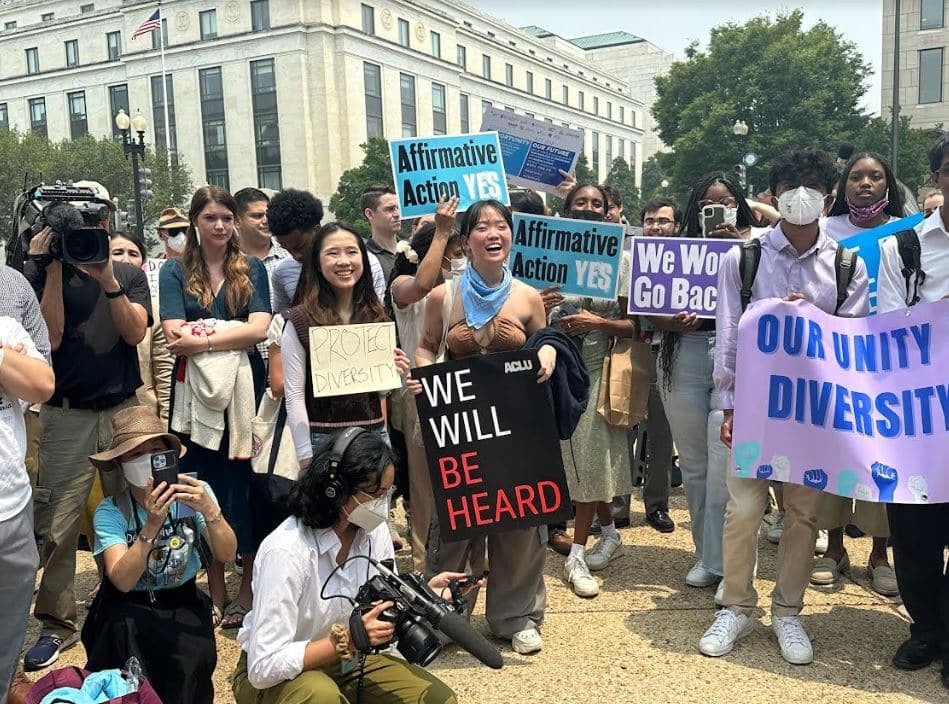High Court Strikes Down Race-Based Affirmative Action in College Admissions

WASHINGTON — The U.S. Supreme Court on Thursday struck down affirmative action admissions policies at Harvard University and the University of North Carolina at Chapel Hill in a ruling that will have wide-ranging implications for academia.
The 6-3 decision effectively overturns decades of court precedent by establishing the universities’ affirmative action policies violate the equal protection clause of the 14th Amendment.
In addition to last year’s overturning of Roe v. Wade, today’s ruling marks the second time in two terms the Supreme Court’s conservative justices undermined prior landmark rulings.
As previously reported by The Well News, the case Students for Fair Admissions, Inc. v. President and Fellows of Harvard College centered on a group of Asian students that claimed they were denied admission to Harvard University and the University of North Carolina.
Both universities denied the accusation.
Writing for the majority, Chief Justice John Roberts said that in the past, the Supreme Court has “permitted race-based admissions only within the confines of narrow restrictions.”
“Both programs lack sufficiently focused and measurable objectives warranting the use of race, unavoidably employ race in a negative manner, involve racial stereotyping and lack meaningful endpoints. We have never permitted admissions programs to work in that way, and we will not do so today,” he added.
Moving from the history to the specifics in this case, Roberts wrote that the interests respondents view as compelling cannot be subjected to meaningful judicial review. These interests include “training future leaders, acquiring new knowledge based on diverse outlooks, promoting a robust marketplace of ideas and preparing engaged and productive citizens.”
While Justice Clarence Thomas commended these interests in a concurring opinion, he deemed them “not sufficiently coherent for purposes of strict scrutiny.”
“It is unclear how courts are supposed to measure any of these goals, or if they could, to know when they have been reached so that racial preferences can end,” he wrote.
As a long-standing opponent of affirmative action, Thomas has fought to repeal policies in place at universities stating they are “rudderless, race-based preferences designed to ensure a particular racial mix in their entering classes.”
He continued, “Those policies fly in the face of our colorblind Constitution and our nation’s equality ideal. In short, they are plainly — and boldly — unconstitutional.”
Thomas went on to quote from Justice John Marshall Harlan’s 1896 dissent to the decision of Plessy v. Ferguson, “Our Constitution is color-blind, and neither knows nor tolerates classes among citizens.”
Also making up the majority in Thursday’s ruling were Justices Brett Kavanaugh, Amy Coney Barrett, Samuel Alito Jr., and Neil Gorsuch.
Justice Sonia Sotomayor responded to the majority’s opinion with a blistering dissent in which she was joined by Justices Elena Kagan and Ketanji Brown Jackson.
“In so holding, the court cements a superficial rule of colorblindness as a constitutional principle in an endemically segregated society where race has always mattered and continues to matter,” she wrote.
Sotomayor strongly criticized the majority’s incorporation of the landmark Brown v. Board of Education decision, denouncing it as a distortion of the historical facts and a disrespect to the esteemed Justice Thurgood Marshall’s legacy, who presented the case before the court in 1954.
“Ignoring race will not equalize a society that is racially unequal,” she continued. “What was true in the 1860s, and again in 1954, is true today: Equality requires acknowledgment of inequality.”
In a separate dissent, Jackson took aim at Thomas’ concurrence, writing that “Justice Thomas’ opinion also demonstrates an obsession with race consciousness that far outstrips my or UNC’s holistic understanding that race can be a factor that affects applicants’ unique life experiences.”
She continued, “Justice Thomas ignites too many more straw men to list or fully extinguish here. The takeaway is that those who demand that no one thinks about race (a classic pink-elephant paradox) refuse to see, much less solve for, the elephant in the room — the race-linked disparities that continue to impede the achievement of our great nation’s full potential.”
Also, in response to Thomas’ preference for a colorblind system, Jackson responded, “With let-them-eat-cake obliviousness, today, the majority pulls the ripcord and announces ‘colorblindness for all’ by legal fiat.”
She continued, “Deeming race irrelevant in law does not make it so in life. And having so detached itself from this country’s actual past and present experiences, the court has now been lured into interfering with the crucial work that UNC and other institutions of higher learning are doing to solve America’s real-world problems.”
Standing outside the courthouse, Christopher Banks, director of Education and Workforce at the Urban League of Portland, said his sadness over the justices’ decision was compounded by the fact it comes just weeks before they start the college application process.
“I would hope and call on every university and college in the United States to work on merit and achievement. If they truly want to work on merit and achievement, then don’t look at anything except grades, internships, and decide on that,” Banks said.
Also commenting in the immediate aftermath of the ruling was Mildred Garcia, president of the American Association of State Colleges and Universities.
“Fifty years since the passage of civil rights legislation has not been nearly enough to address or correct more than 350 years of discriminatory practices intended to keep people of color away from higher education institutions or, starting in the 19th century, severely limit their prospects of increasing their educational attainment,” Garcia said.
“Today’s decision will have negative consequences for all Americans and diminish our society’s economic and social development. … We must not lose the important ground that has been gained. We must not revert to an inequitable society,” she added.
You can reach us at [email protected] and follow us on Facebook and Twitter
























